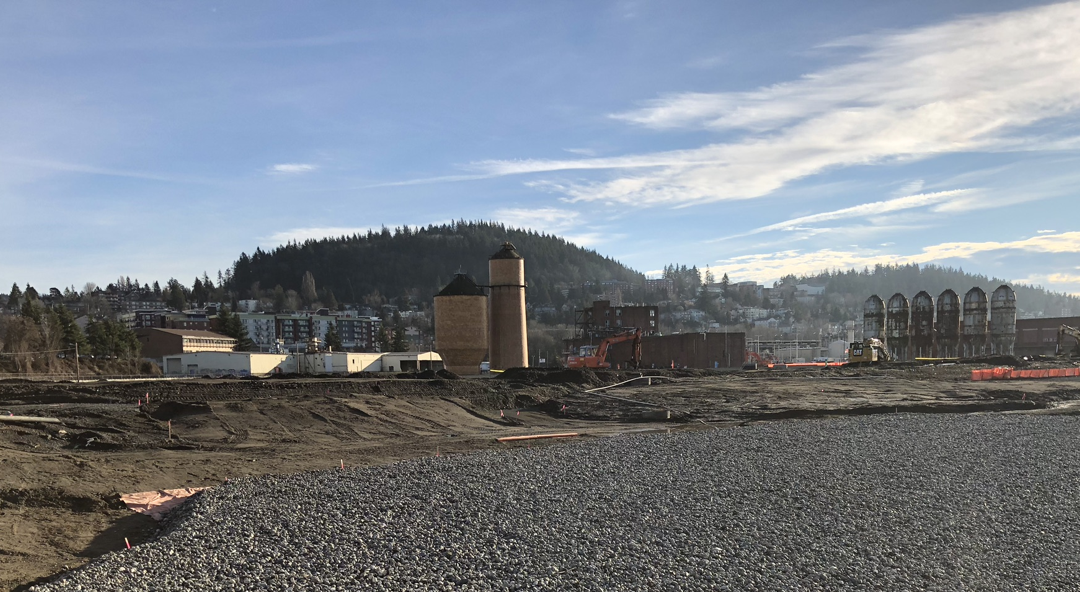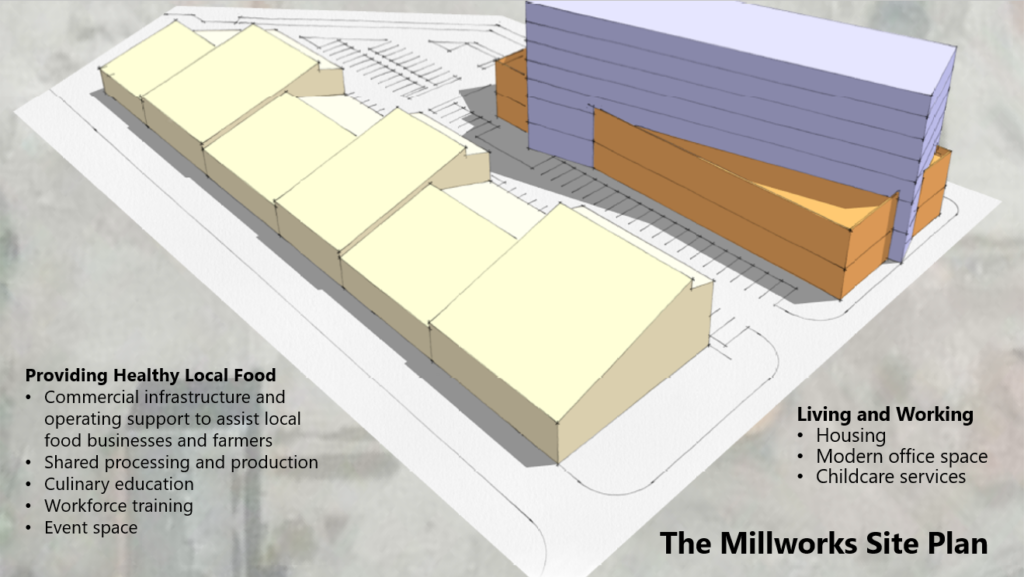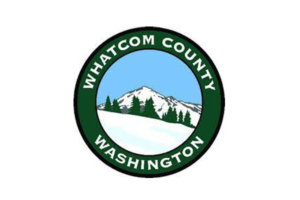Large food system changes need innovative thinkers, like the Whatcom Community Foundation in Washington State, that galvanizes the larger community to build a viable local food system that feeds people and sustains the land. Their vision is to develop a local food campus that will engage every stakeholder and sector of the local food system. New Venture Advisors spoke with Mauri Ingram, President and CEO, and Suki Paciorek, Director of Special Projects, about how they decided to pursue a local food campus.
ENVISIONING A STRONGER FOOD SYSTEM
About two hours north of Seattle, Bellingham, Whatcom County’s largest city, is located on the Puget Sound, the farthest northwestern pinpoint of the United States map. Within the county exists a large agricultural economy, which consists of both small food producers and large commodity farmers. While there is ample food produced locally, most of it is exported elsewhere. Hoping to change the trajectory, Whatcom Community Foundation (WCF) started asking how they could catalyze the local food system.
Whatcom Community Foundation’s mission is to amplify the force of philanthropy—by connecting people, ideas and resources—so that communities flourish. They strategize to thoughtfully respond to long-term challenges and realize new community dreams and projects.
Led by their mission, the Foundation’s initial thought was to develop a food hub, but as they engaged a wide range of food system stakeholders, they realized the concept was too narrow. And besides, WCF’s culture is based on possibility. Thus, they introduced a paradigm shifting idea: a local food campus.
By providing a framework around an unshaped concept, the conversations about what it could be led to a collective vision of a place where all could flourish. Needs identified in the community ranged from services for the aging population and resources for low-income families. Ideas for the food campus evolved into larger systemic needs. WCF’s perspective to “grow the pie, not slice it up” resulted in novel ideas that now seem like a natural fit.
While food is still the center, the project, named The Millworks, now includes affordable housing developments, both rental and ownership, and an early childhood daycare center.
PLANNING WITH THE COMMUNITY
The Millworks project encapsulates WCF’s values of ensuring everyone involved in food and agriculture in Whatcom County—including farmers and Native American communities—are involved in creating the food campus. Its purpose is to benefit the entire community, a growing challenge for WCF to coordinate with so many stakeholders involved, but WCF is quick to say that the Food Campus is not their project. Rather, they are the vehicle to make it happen.
The Foundation set an early precedent to take a holistic approach that allows each stakeholder to take part in creating the vision. However, creating a business model that includes multiple priorities is slow, painstaking, and requiring complex conversations to ensure the project is completed with integrity and equity.
A major completed step in the project is the selection of a site, a process that considered each stakeholder’s criteria. The site is an undeveloped brownfield space located on the waterfront. The land is currently owned by the Port Authority. A long-term lease will be signed after the site is cleaned up and the organizational structure and operating plan for The Millworks is finalized. In the meantime, WCF is identifying anchor tenants and securing investments that will contribute to the long-term sustainability of The Millworks.
An added benefit of this site is that it qualifies for Opportunity Zone investment. While Opportunity Zone Funds are a valuable tool for attracting investors, they do not require community benefit agreements. One of WCF’s most important roles is to communicate the vision of the food campus to each partner and investor, and ensure their commitment stems from meeting the needs identified in the community that The Millworks exists to address.
Because equity is at the core of the project, WCF is reaching out to partners whose voices are not yet represented in the conversation. They are also working with nonprofits who are already doing important work to address these needs in Whatcom County to build more essential links.
LEADING THE WAY FORWARD
The synergies and possibilities that exist in this concept seem limitless. WCF is excited to demonstrate how the community can be a part of making The Millworks happen through a variety of roles. Moreover, they are excited to demonstrate by example that projects like this, specifically on brownfield spaces, can be replicated.
When asked how other communities can embark on their own projects of this scale, Mauri says it starts with creating the condition for what is possible. It will be hard to build a big vision if people get stuck in logistics. She offers the following tips:
- Understand the community context and needs of the community
- Find the right people to invest – community benefit projects require leveraging long-term partnerships where trust is established
- Gain early support from key anchor tenants and investors who can bring others (especially skeptics) on board
- Identify the project’s purpose and let that drive the vision
- Know how to frame the message to connect with your audience, and use a variety of tactics to facilitate meaningful conversation and crack open the can of imagination
- Design something that is doable
- Be nimble with potential tenants/partners as some may require more interim steps in order to have adequate capacity and/or resources
Ultimately, projects like The Millworks come down to the nuts and bolts of financing. To this Mauri encourages project leaders to “hold loosely” to their concept. Holding too tightly leads to unwarranted control which creates fear. In a loose hand, space is given to create something that is truly reflective of the community. And this builds confidence with tenants, partners, and investors that changes will occur to keep the project community-focused.
We encourage you to follow WCF’s progress as they draft the blueprint for mixed-use, multi-enterprise, food system-driven economic development in brownfield spaces. And we encourage you to donate to support Whatcom Community Foundation’s diverse portfolio of community initiatives.
Image: The Millworks Site Plan, RMC Architects




